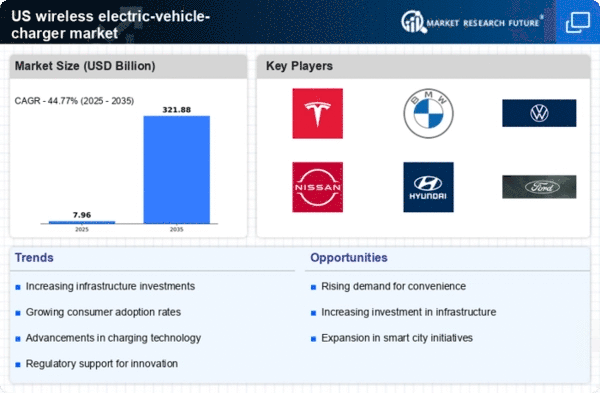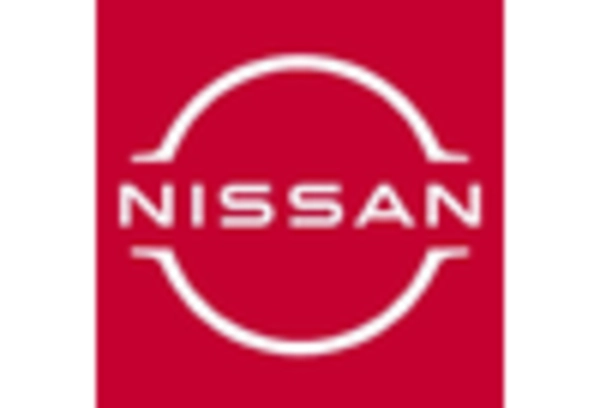Consumer Awareness and Education
Consumer awareness and education are emerging as significant drivers in the wireless electric-vehicle-charger market. As electric vehicles gain popularity, consumers are becoming more informed about the benefits of wireless charging technology. Educational campaigns by manufacturers and environmental organizations are helping to demystify the technology, highlighting its convenience and efficiency. Surveys indicate that approximately 60% of potential electric vehicle buyers express interest in wireless charging solutions, suggesting a growing market potential. Additionally, as more consumers experience the advantages of wireless charging, word-of-mouth recommendations are likely to further enhance market penetration. This increasing awareness is crucial for the wireless electric-vehicle-charger market, as it fosters a more informed consumer base that is willing to invest in innovative charging solutions.
Growing Infrastructure Investment
The wireless electric-vehicle-charger market is experiencing a surge in infrastructure investment, driven by both public and private sectors. Federal and state governments are allocating substantial funds to enhance charging networks, with an estimated $7.5 billion earmarked for electric vehicle infrastructure in the recent infrastructure bill. This investment is likely to facilitate the installation of wireless charging stations across urban and suburban areas, thereby increasing accessibility for consumers. As the infrastructure expands, it is anticipated that the adoption of electric vehicles will rise, further propelling the wireless electric-vehicle-charger market. The integration of wireless technology into existing charging stations may also enhance user experience, making charging more convenient and efficient. Consequently, this growing investment in infrastructure is a pivotal driver for the wireless electric-vehicle-charger market, as it lays the groundwork for widespread adoption and usage.
Environmental Sustainability Initiatives
The wireless electric-vehicle-charger market is being propelled by increasing environmental sustainability initiatives. As concerns over climate change intensify, both consumers and corporations are seeking greener alternatives to traditional fossil fuel-powered vehicles. The transition to electric vehicles is seen as a vital step in reducing carbon emissions. In the US, the Biden administration has set ambitious targets to achieve a 50-52% reduction in greenhouse gas emissions by 2030, which includes promoting electric vehicle adoption. This regulatory push is likely to stimulate demand for wireless charging solutions, as they offer a more sustainable and efficient way to power electric vehicles. Furthermore, the wireless electric-vehicle-charger market is expected to benefit from partnerships between automakers and charging solution providers, aimed at developing eco-friendly charging infrastructure.
Partnerships and Collaborations in the Industry
Partnerships and collaborations within the wireless electric-vehicle-charger market are becoming increasingly prevalent, serving as a catalyst for growth. Automakers, technology firms, and energy providers are joining forces to develop integrated charging solutions that enhance user experience. For instance, collaborations between automotive manufacturers and wireless charging technology companies are likely to lead to the creation of vehicles equipped with built-in wireless charging capabilities. Such partnerships not only streamline the development process but also facilitate the sharing of resources and expertise. Furthermore, these alliances can help in addressing regulatory challenges and standardizing charging protocols, which are essential for widespread adoption. As these collaborations continue to evolve, they are expected to significantly impact the wireless electric-vehicle-charger market, driving innovation and expanding market reach.
Technological Innovations in Charging Solutions
Technological innovations are playing a crucial role in shaping the wireless electric-vehicle-charger market. Advancements in inductive charging technology, which allows for the transfer of energy without physical connectors, are becoming increasingly prevalent. Companies are investing heavily in research and development to enhance the efficiency and speed of wireless charging systems. For instance, some systems are now capable of delivering up to 20 kW of power, significantly reducing charging times. Moreover, the integration of smart technology, such as mobile apps for monitoring charging status and energy consumption, is likely to attract tech-savvy consumers. As these innovations continue to evolve, they are expected to enhance the appeal of wireless charging solutions, thereby driving growth in the wireless electric-vehicle-charger market.
















